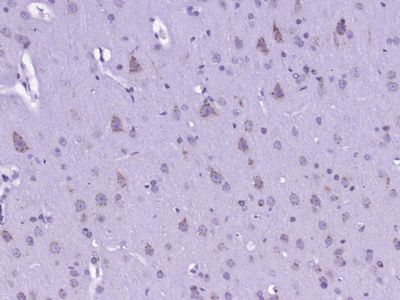CARD12 Polyclonal Antibody
Purified Rabbit Polyclonal Antibody (Pab)
- SPECIFICATION
- CITATIONS
- PROTOCOLS
- BACKGROUND

Application
| IHC-P, IHC-F, IF, ICC, E |
|---|---|
| Primary Accession | Q9NPP4 |
| Reactivity | Rat |
| Host | Rabbit |
| Clonality | Polyclonal |
| Calculated MW | 116 KDa |
| Physical State | Liquid |
| Immunogen | KLH conjugated synthetic peptide derived from human CARD12 |
| Epitope Specificity | 401-500/1024 |
| Isotype | IgG |
| Purity | affinity purified by Protein A |
| Buffer | 0.01M TBS (pH7.4) with 1% BSA, 0.02% Proclin300 and 50% Glycerol. |
| SUBCELLULAR LOCATION | Cytoplasm. Cytoplasm, cytosol. Note=Cytoplasmic filaments. |
| SIMILARITY | Contains 1 CARD domain. Contains 14 LRR (leucine-rich) repeats. Contains 1 NACHT domain. |
| SUBUNIT | Component of the NLRC4 inflammasome. Homooligomer. Interacts with ASC, pro-caspase-1, NOD2, BCL10 and NALP1 (NAC) by CARD-CARD interaction. Interacts with EIF2AK2/PKR. |
| Post-translational modifications | Phosphorylated at Ser-533 following infection of macrophages with S.typhimurium (Salmonella). Phosphorylation is essential for NLRC4 inflammasome function to promote caspase-1 activation and pyroptosis. PRKCD phosphorylates Ser-533 in vitro. |
| Important Note | This product as supplied is intended for research use only, not for use in human, therapeutic or diagnostic applications. |
| Background Descriptions | NLR family CARD domain-containing protein 4 is a protein that in humans is encoded by the NLRC4 gene. NLRC4 is best associated with triggering formation of the inflammasome. Unlike NLRP3, certain inflammasome-dependent functions of NLRC4 may be carried out independently of the inflammasome scaffold ASC. Human Ced4 homologs include APAF1, NOD1 (CARD4), and NOD2 (CARD15). These proteins have at least 1 N-terminal CARD domain followed by a centrally located nucleotide-binding domain (NBD or NACHT) and a C-terminal regulatory domain, found only in mammals, that contains either WD40 repeats or leucine-rich repeats (LRRs). CARD12 is a member of the Ced4 family and can induce apoptosis. |
| Gene ID | 58484 |
|---|---|
| Other Names | NLR family CARD domain-containing protein 4, CARD, LRR, and NACHT-containing protein, Clan protein, Caspase recruitment domain-containing protein 12, Ice protease-activating factor, Ipaf, NLRC4, CARD12, CLAN, CLAN1, IPAF |
| Target/Specificity | Isoform 2 is expressed ubiquitously, although highly expressed in lung and spleen. Isoform 1 is highly expressed in lung, followed by leukocytes especially monocytes, lymph node, colon, brain, prostate, placenta, spleen, bone marrow and fetal liver. Isoform 4 is only detected in brain. |
| Dilution | IHC-P=1:100-500,IHC-F=1:100-500,ICC=1:100-500,IF=1:100-500,ELISA=1:5000-10000 |
| Storage | Store at -20 ℃ for one year. Avoid repeated freeze/thaw cycles. When reconstituted in sterile pH 7.4 0.01M PBS or diluent of antibody the antibody is stable for at least two weeks at 2-4 ℃. |
| Name | NLRC4 |
|---|---|
| Function | Key component of inflammasomes that indirectly senses specific proteins from pathogenic bacteria and fungi and responds by assembling an inflammasome complex that promotes caspase-1 activation, cytokine production and macrophage pyroptosis (PubMed:15107016). The NLRC4 inflammasome is activated as part of the innate immune response to a range of intracellular bacteria (By similarity). |
| Cellular Location | Cytoplasm. Cytoplasm, cytosol {ECO:0000250|UniProtKB:Q3UP24}. Inflammasome |
| Tissue Location | Isoform 2 is expressed ubiquitously, although highly expressed in lung and spleen. Isoform 1 is highly expressed in lung, followed by leukocytes especially monocytes, lymph node, colon, brain, prostate, placenta, spleen, bone marrow and fetal liver. Isoform 4 is only detected in brain |

Thousands of laboratories across the world have published research that depended on the performance of antibodies from Abcepta to advance their research. Check out links to articles that cite our products in major peer-reviewed journals, organized by research category.
info@abcepta.com, and receive a free "I Love Antibodies" mug.
Provided below are standard protocols that you may find useful for product applications.
If you have used an Abcepta product and would like to share how it has performed, please click on the "Submit Review" button and provide the requested information. Our staff will examine and post your review and contact you if needed.
If you have any additional inquiries please email technical services at tech@abcepta.com.













 Foundational characteristics of cancer include proliferation, angiogenesis, migration, evasion of apoptosis, and cellular immortality. Find key markers for these cellular processes and antibodies to detect them.
Foundational characteristics of cancer include proliferation, angiogenesis, migration, evasion of apoptosis, and cellular immortality. Find key markers for these cellular processes and antibodies to detect them. The SUMOplot™ Analysis Program predicts and scores sumoylation sites in your protein. SUMOylation is a post-translational modification involved in various cellular processes, such as nuclear-cytosolic transport, transcriptional regulation, apoptosis, protein stability, response to stress, and progression through the cell cycle.
The SUMOplot™ Analysis Program predicts and scores sumoylation sites in your protein. SUMOylation is a post-translational modification involved in various cellular processes, such as nuclear-cytosolic transport, transcriptional regulation, apoptosis, protein stability, response to stress, and progression through the cell cycle. The Autophagy Receptor Motif Plotter predicts and scores autophagy receptor binding sites in your protein. Identifying proteins connected to this pathway is critical to understanding the role of autophagy in physiological as well as pathological processes such as development, differentiation, neurodegenerative diseases, stress, infection, and cancer.
The Autophagy Receptor Motif Plotter predicts and scores autophagy receptor binding sites in your protein. Identifying proteins connected to this pathway is critical to understanding the role of autophagy in physiological as well as pathological processes such as development, differentiation, neurodegenerative diseases, stress, infection, and cancer.


